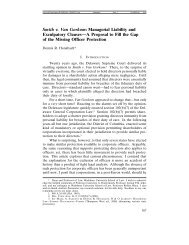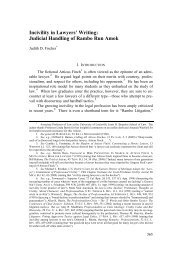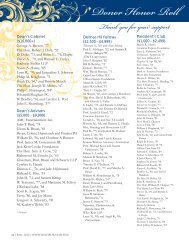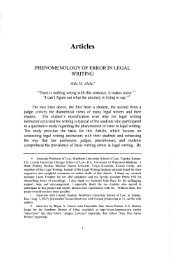Washburn Lawyer, v. 48, no. 1 - Washburn University School of Law
Washburn Lawyer, v. 48, no. 1 - Washburn University School of Law
Washburn Lawyer, v. 48, no. 1 - Washburn University School of Law
Create successful ePaper yourself
Turn your PDF publications into a flip-book with our unique Google optimized e-Paper software.
CENTER FOR<br />
<strong>Law</strong> and Government<br />
DIRECTOR NAMED FOR THE CENTER<br />
FOR LAW AND GOVERNMENT<br />
<strong>Washburn</strong> <strong>University</strong> <strong>School</strong> <strong>of</strong> <strong>Law</strong><br />
is pleased to an<strong>no</strong>unce Reginald<br />
L. Robinson as the inaugural director<br />
for its Center for <strong>Law</strong> and Government.<br />
Robinson will be responsible for<br />
development <strong>of</strong> the Center, which was<br />
launched in 2008 as a way for <strong>Washburn</strong><br />
<strong>Law</strong> to refocus its ability to provide<br />
graduates expanded opportunities for<br />
public service.<br />
“I am truly energized about having<br />
the opportunity to join the <strong>Washburn</strong><br />
<strong>University</strong> community and the <strong>Washburn</strong> <strong>Law</strong><br />
faculty in this very exciting role,” said Robinson.<br />
“I look forward to returning to a law school<br />
classroom and working with students after so<br />
many years away from work that I love very much.<br />
And I am especially grateful that through my<br />
leadership <strong>of</strong> the law school’s Center for <strong>Law</strong> and<br />
Government, I will have the opportunity to forge<br />
an ongoing and positive connection with issues<br />
related to government and policy in Kansas and<br />
beyond. This is a tremendous opportunity and<br />
I look forward to becoming a member <strong>of</strong> the<br />
<strong>Washburn</strong> <strong>Law</strong> team.”<br />
From 2002 to 2010, Robinson served as president<br />
and chief executive <strong>of</strong>fi cer <strong>of</strong> the Kansas Board<br />
<strong>of</strong> Regents, which provides strategic leadership<br />
for the state’s public higher education enterprise.<br />
Before his appointment as CEO, Robinson served<br />
jointly as chief <strong>of</strong> staff to <strong>University</strong> <strong>of</strong> Kansas<br />
Chancellor Robert Hemenway and as a visiting<br />
associate pr<strong>of</strong>essor in the KU <strong>School</strong> <strong>of</strong> <strong>Law</strong>. He<br />
has also served on the President’s Commission<br />
on White House Fellowships, worked for the<br />
U.S. Department <strong>of</strong> Justice, and served as deputy<br />
associate attorney general <strong>of</strong> the United States.<br />
12 | FALL 2010 | WWW.WASHBURNLAW.EDU<br />
Reginald L. Robinson<br />
ROBINSON’S VISION FOR THE<br />
CENTER’S FUTURE<br />
Reginald Robinson’s governmental<br />
experience in Washington, D.C., has<br />
helped him formulate a vision and structure<br />
for the Center for <strong>Law</strong> and Government<br />
and create a mission that he describes as<br />
two-fold: student-focused to provide an<br />
exceptional legal education that prepares<br />
graduates for careers in the fi elds <strong>of</strong> law,<br />
government, and public policy; and public<br />
education-focused to broadly educate<br />
the public <strong>of</strong> the issues situated at the<br />
intersection <strong>of</strong> law, government, and public<br />
policy, and the workings <strong>of</strong> government at<br />
all levels. Robinson, pr<strong>of</strong>essor and director <strong>of</strong> the Center,<br />
describes his Washington, D.C., employment experiences,<br />
including his stint as deputy associate attorney general<br />
<strong>of</strong> the United States, as “<strong>no</strong>t just a window into how<br />
government works but actually participating in the<br />
process.”<br />
To that end, he has included students, alumni and faculty<br />
in the planning process before formalizing the scope and<br />
curriculum for the Center. Robinson conducted a Lunch<br />
and Learn in a town hall format where he talked with<br />
students about the intended mission and activities <strong>of</strong> the<br />
Center. He also outlined the proposed curriculum and<br />
requirements for students to earn a Certifi cate in <strong>Law</strong><br />
and Government, received student feedback and reaction<br />
to those ideas, and discussed the creation <strong>of</strong> a student<br />
law and government group that would generate program<br />
ideas, help execute programs, and serve as a student<br />
advisory board for the Center. Robinson’s all-inclusive<br />
planning process, he believes, will ensure the Center’s<br />
<strong>of</strong>ferings are adaptable to meet changing times.<br />
“You don’t want to develop and move forward,” he<br />
explained. “You want to develop a process to ask for<br />
feedback and shape the program.”<br />
Immediate goals for the Center include fi nalizing<br />
curricula and receiving approval <strong>of</strong> requirements, which<br />
is expected in 2011.






